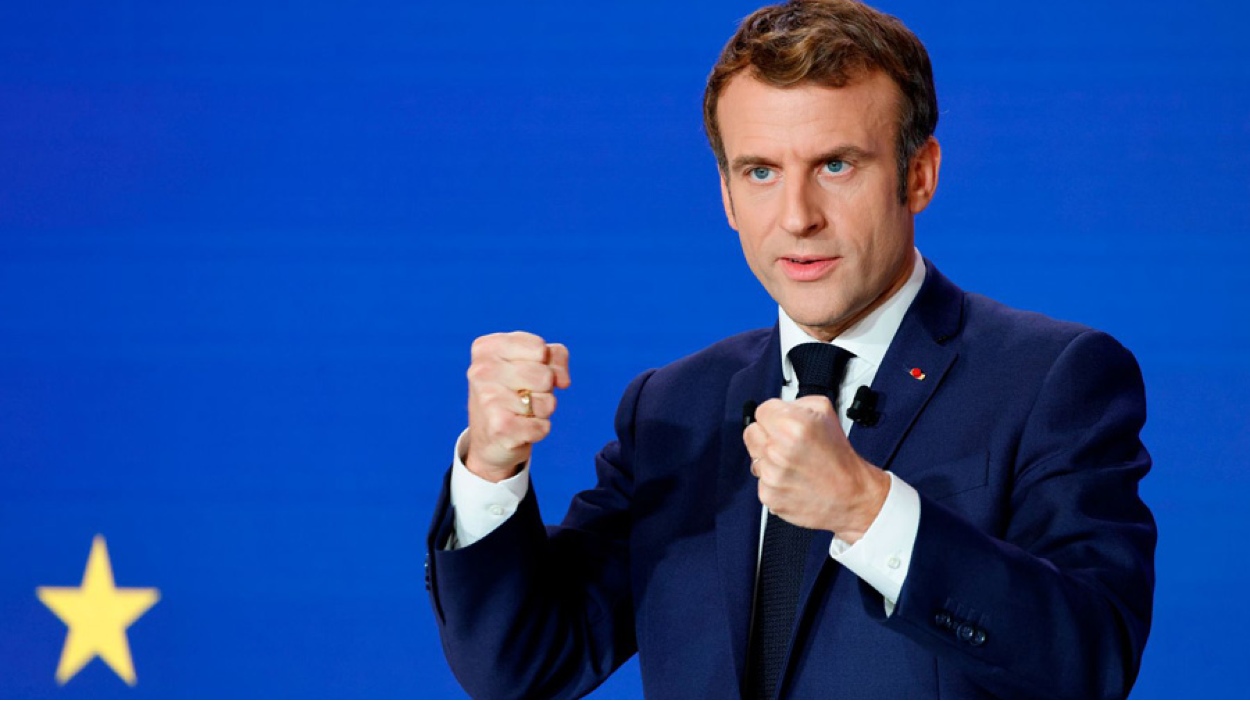In the wake of Israel’s official declaration of war against Hamas, which came in response to an unprecedented assault by the Gaza-based terrorist group, French President Emmanuel Macron denounced the attacks and expressed wholehearted solidarity with those affected and their families.
Attack On Israel: Russia Says NATO Weapons Transferred To Ukraine Are Being Used To Strike Israel
Amidst these ongoing events, a video depicting the French President engaged in a heated and confrontational exchange with Israeli police officers during his 2020 visit to a church in Jerusalem has resurfaced on various social media platforms.
The video shows an incident during Macron’s visit to the Church of St. Anne in Jerusalem’s historic Old City in 2020.
Since it was gifted by the Ottomans to French Emperor Napoleon III in 1856, the French tricolor flag has continuously waved above the Church of St. Anne in Jerusalem’s fortified Old City.
The presence of Israeli police within the sandstone complex of the church is viewed as a sensitive matter in France, as it is considered French territory.
In the incident video, President Macron can be observed amid a densely packed group within an archway leading to the building.
“Go outside. I’m sorry, you know the rules. Nobody has to provoke, nobody,” the president can be observed saying to the security personnel. “I don’t like what you did in front of me. Please respect the rules as they have been for centuries. They will not change with me, I can tell you,” he continued.
#Video | Macron argues with Israeli police during visit to Church of St Anne in Jerusalem https://t.co/fHVblnRkPt pic.twitter.com/a9jkv2s6p3
— Anadolu English (@anadoluagency) January 22, 2020
Nevertheless, the incident in 2020 had an eerie sense of déjà vu. In 1996, then-French President Jacques Chirac also reached a breaking point with Israeli security personnel at the same church. He pointedly labeled their actions “provocation” and even threatened to return to his plane.
Chirac refused to step inside St. Anne until Israeli security withdrew from the premises. “What, do you want me to go back to my plane and go back to France? Is that what you want?” he said.
This historical parallel underscores the sensitivity of the Church of St. Anne and the enduring diplomatic challenges it presents.
History Of The Church Of St. Anne
The Church of St. Anne was constructed between 1131 and 1138 when the Crusaders held Jerusalem. Its location was carefully chosen, built near the remains of a Byzantine basilica and atop a grotto believed to be the childhood home of the Virgin Mary, mother of Jesus.
St. Anne’s stands out because it miraculously survived the 1187 conquest of Jerusalem by Saladin, a prominent Muslim leader of the time, setting it apart from many other Crusader churches.
Instead of being razed to the ground, the church was converted into a madrasa, an Islamic educational institution, in 1192. It became known as “al-Madrasa as-Salahiyya,” bearing Saladin’s name, as is still evident from the Arabic inscription above the entrance.

During the 15th century, the madrasa established in St. Anne’s Church gained widespread acclaim as the most prestigious college in Jerusalem. Many students studied here, including a famous Islamic scholar named Mujir al-Din.
Under Ottoman rule, Christian pilgrims sought to visit the grotto believed to be the childhood home of the Virgin Mary. However, access came at a price, as pilgrims were required to pay a fee for entry. Over time, the madrasa was abandoned, and the former church building fell into disrepair.
In 1856, the Ottoman sultan Abdülmecid I presented the Church of St. Anne to Napoleon III of France as a token of gratitude for French support during the Crimean War. This marked a turning point in the church’s history.
In 1862, the French government sent architect Christophe-Edouard Mauss to Jerusalem to oversee the renovation of St. Anne’s Church.
During this extensive restoration project in 1873, Mauss discovered the vestiges of the Bethesda Pool, a critical archaeological find that added another layer to the site’s historical significance.
The Church of St. Anne is among the four properties in the Holy Land owned by the French government as part of the “Domaine national français.”
Following international law, which regards East Jerusalem as occupied territory, France does not acknowledge Israeli authority over East Jerusalem, the location of St. Anne’s Church.
- Contact the author at ashishmichel(at)gmail.com
- Follow EurAsian Times on Google News